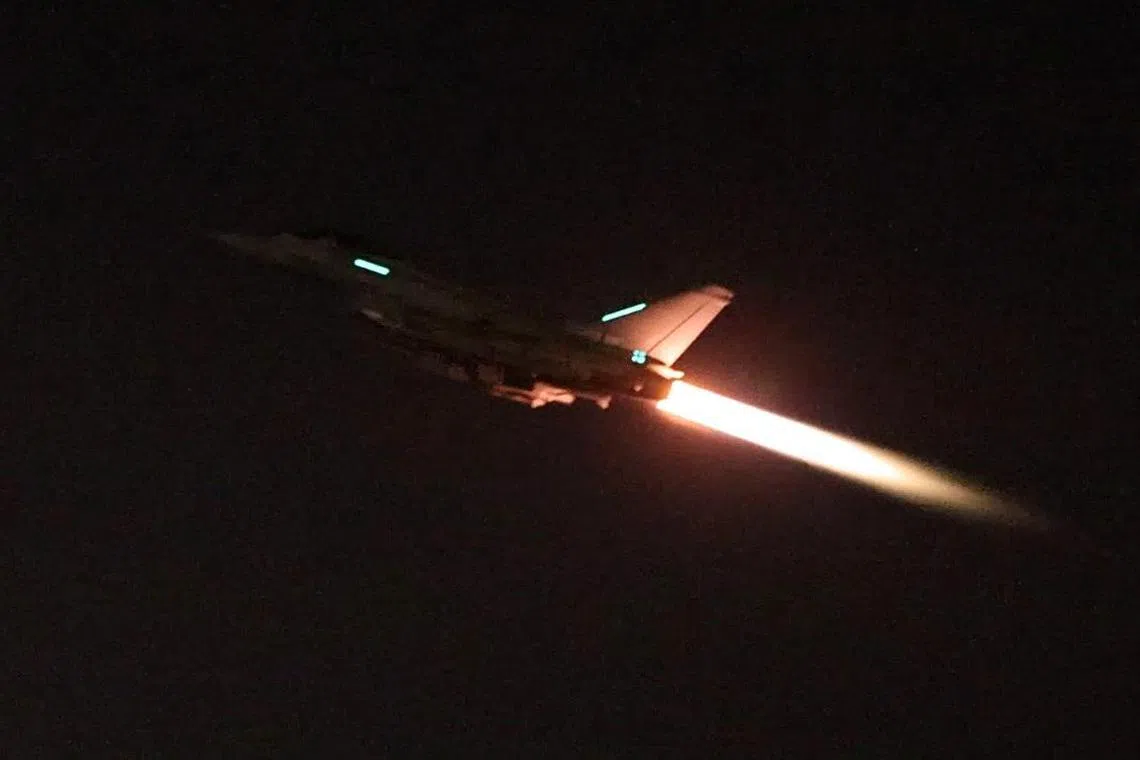Oil prices jump as US and UK launch air strikes on Houthi rebels in Yemen
Sign up now: Get ST's newsletters delivered to your inbox

An RAF Typhoon aircraft takes off to join the US-led coalition to conduct air strikes against military targets in Yemen.
PHOTO: REUTERS
Follow topic:
Singapore – Oil jumped as the United States and Britain launched air strikes against Houthi rebel targets in Yemen,
West Texas Intermediate (WTI) crude surged 2.4 per cent to US$73.78 a barrel as at 9.48am on Jan 12, while Brent rose 2.3 per cent to US$79.20.
US President Joe Biden said the US and allies had successfully conducted strikes against a number of targets after a string of attacks by the Iranian-backed group on vessels in the Red Sea
Earlier this week, the Houthis launched their largest assault to date on shipping in the key waterway,
That prompted warnings of retaliation from Washington.
Adding to the turmoil, Iran seized a tanker off the coast of Oman on Jan 11.
Tensions in the Middle East have been rising since the outbreak of the Israel-Hamas war in October, with the Houthis firing missiles at ships on an almost-daily basis over the past two months.
The group has said it will not back down until Israel stops fighting Hamas, which is also funded by Iran.
Oil has been buffeted since the start of 2024, often moving more than US$2 each day without setting a clear direction. While the fighting in the Middle East has supported crude, concerns about rising non-Opec+ supply, deep pricing cuts by Saudi Arabia, and expanding US stockpiles have weighed on prices.
“The US, UK had warned that action would take place if the Houthi rebels continued their attacks, so this action should not really be unexpected,” said Mr Robert Rennie, head of commodity and carbon research at Westpac Banking.
Still, WTI may surpass US$75 and Brent could exceed US$80, he said.
The air strikes are a gamble for the US and Britain, which have repeatedly said a priority amid the Israel-Hamas fighting is to keep it from spreading. There are concerns from Saudi Arabia and others that such action will inflame tensions.
Citigroup estimates that geopolitical risks in the Middle East have added US$2 to US$3 barrel to Brent, and that the risk premium may increase substantially if supply disruptions increased.
Standard Chartered, meanwhile, said that oil is underpriced by at least US$10 a barrel.
The Houthi action in the Red Sea had prompted many commercial shippers to direct vessels around the southern tip of Africa, rather than risk a passage through the waterway that links to the Suez Canal. That has increased costs. BLOOMBERG

